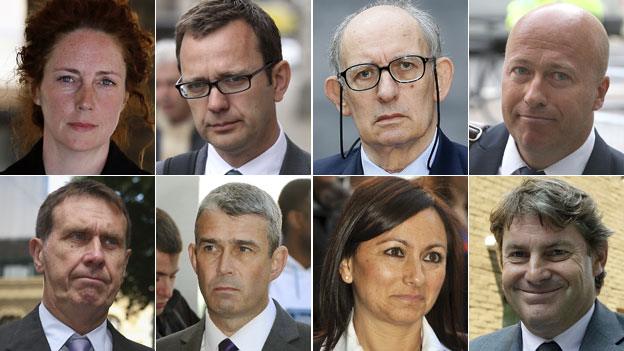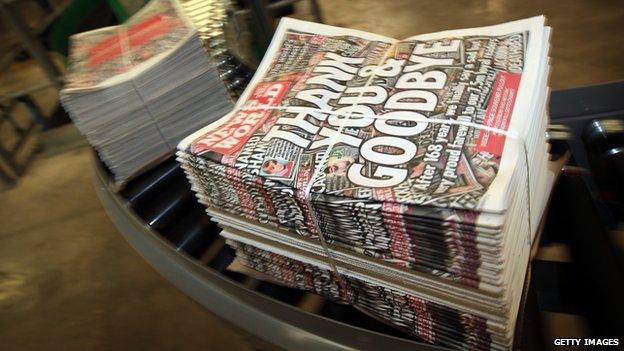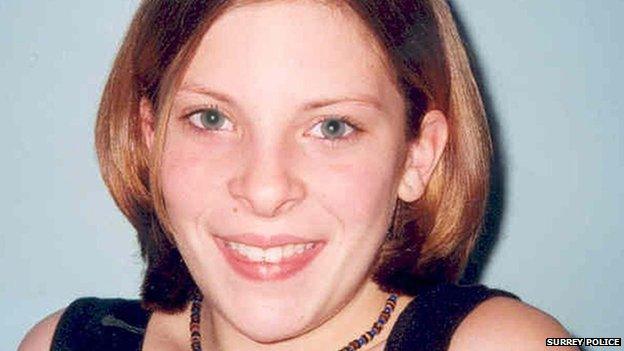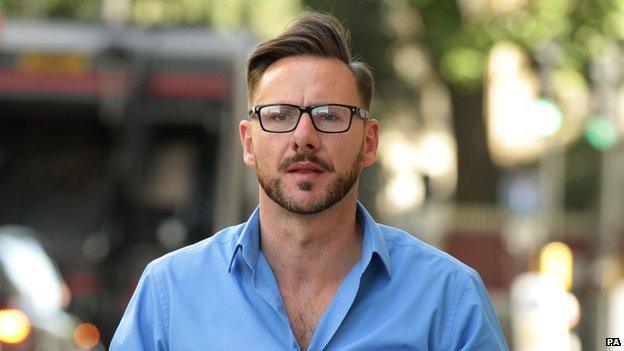Phone-hacking trial explained
- Published

Clockwise from top left: Rebekah Brooks, Andy Coulson, Stuart Kuttner, Ian Edmondson (who will be tried by a different jury at a later date) Charlie Brooks, Cheryl Carter, Mark Hanna, and Clive Goodman
Former News of the World editor Andy Coulson was found guilty of conspiracy to hack phones and one-time chief executive Rebekah Brooks was cleared in what became known as the phone-hacking trial. Four other defendants were cleared along with Ms Brooks.
What was the hacking trial?
Allegations that News International journalists were involved in hacking people's phones for information led to the closure of the 168-year-old News of the World tabloid in 2011 and a trial costing reportedly up to £100m, external.
The scandal went to the heart of Downing Street. Among those in the dock at London's Old Bailey for the eight-month trial were a close family friend of the prime minister and Coulson, David Cameron's official spokesman.

The News of the World had almost three million readers when it closed
It was some nine years ago that the News of the World published a story about Prince William's treatment for an injury, based on information that it could only have come by because one of its journalists had listened to the prince's voicemails.
The ensuing police investigation, which uncovered "a vast number" of other victims, would begin the saga that led to the conviction of Coulson, the closure of a newspaper bought by millions every week and moves to change the way newspapers are regulated.

What is phone hacking?
Phone hacking was a technique used to listen to people's mobile voicemail. Reporters and a private investigator working for the News of the World used it to target people in the news - celebrities, politicians and crime victims - so they could find angles on stories that would get them ahead of the competition. They would listen to private messages left on voicemail, make a recording of them, and use the information to help write stories.

Why did this trial come about?
The News of the World was closed down in 2011 after its owners, Rupert Murdoch's News International, admitted the scale of hacking that had been going on, dating back many years.
The company had battled against growing allegations for two years - one of its private investigators and the News of the World's royal editor were jailed in 2007 over a story gleaned from hacking.

Voicemails left on Milly Dowler's phone were intercepted after she went missing
The paper's original position - that rogue staff had acted alone - could not stand. Eventually Rupert Murdoch decided he had no choice but to close the newspaper down after it emerged Milly Dowler, a teenager who was abducted and murdered, had her voicemails hacked.
The Crown Prosecution Service charged two former editors - Rebekah Brooks and her successor Andy Coulson with conspiracy to intercept mobile voicemails alongside others connected to the newspaper.

Who was on trial?
Alongside Rebekah Brooks and Coulson was former managing editor Stuart Kuttner. Five others had pleaded guilty to conspiracy to hack phones before the trial began: private investigator Glenn Mulcaire, news editors James Weatherup and Greg Miskiw and reporters Neville Thurlbeck and Dan Evans. Mulcaire performed thousands of hacks for the newspaper under the instruction of news editors.
The newspaper's former royal editor Clive Goodman was also charged with illegal payments to public officials - as was Rebekah Brooks and Coulson.
Brooks' husband Charlie Brooks, her former personal assistant Cheryl Carter and News International's head of security Mark Hanna were accused of a conspiracy to hide material from the police.
Mrs Brooks, Charlie Brooks, Cheryl Carter, Mr Kuttner and Mr Hanna were cleared of all charges against them.
The jury was discharged after failing to reach verdicts on charges that Coulson and Goodman conspired to commit misconduct in a public office by paying police officers for two royal directories.

How did hacking come to light?
Glenn Mulcaire and Clive Goodman were jailed seven years ago after pleading guilty to intercepting voicemails - but that first trial only concerned a small number of cases. Police did not go through all the evidence seized from Mulcaire. Two years later it emerged that News International had agreed a series of confidential out-of-court settlements which had prevented more allegations being aired.

How did the newspaper carry out hacking?

Glenn Mulcaire was paid £100,000 a year by the News of the World, the court heard
Private investigator Glenn Mulcaire would be "tasked" to target a particular mobile phone number to acquire voicemails and report back to the news desk. Mulcaire kept detailed notes of each operation that he carried out, including the target and who had commissioned him. At one point he was being paid £100,000 a year.
Prosecutors sought to prove that Rebekah Brooks and Coulson were part of this conspiracy because they must have known how stories were being acquired and who was being paid. Rebekah Brooks was acquitted of all charges.